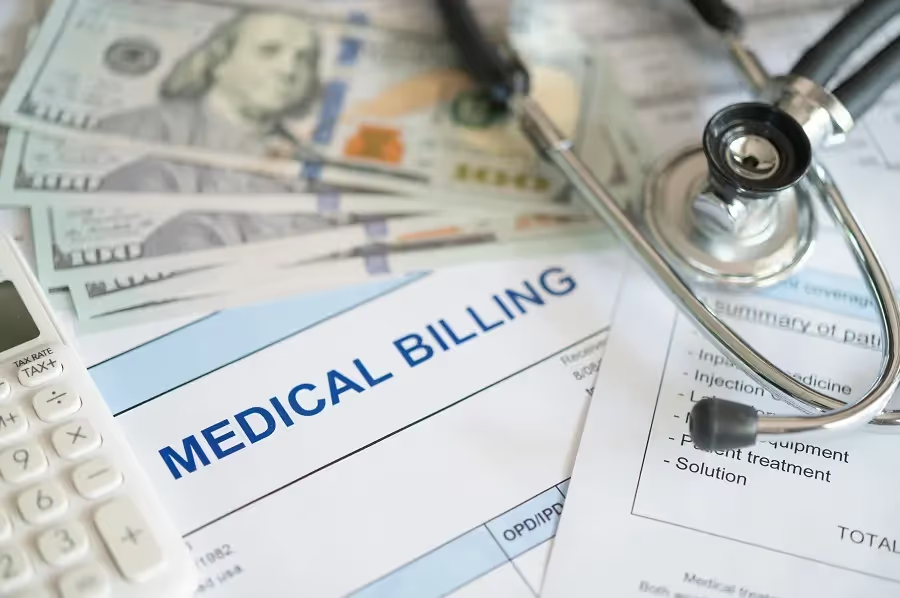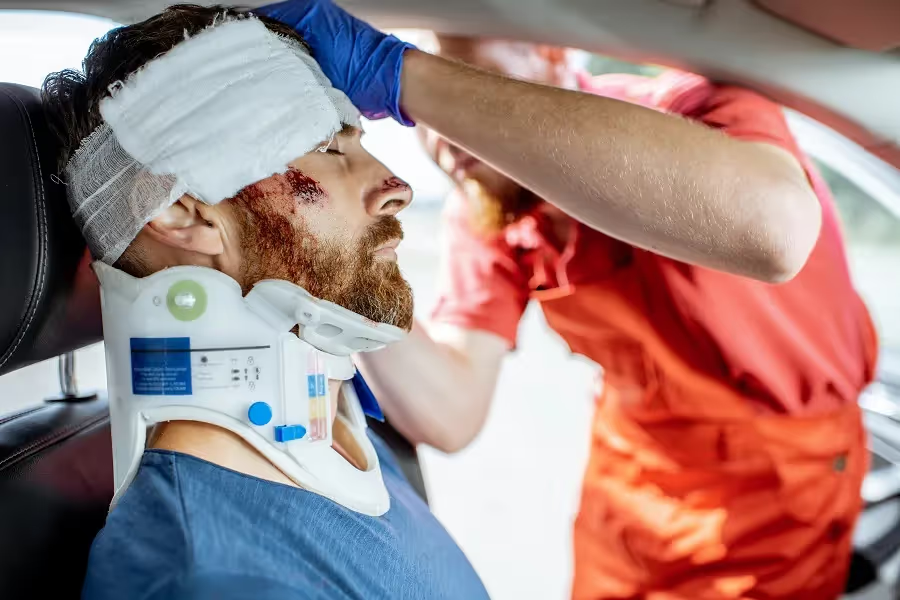Rob Fellows is a renowned personal injury attorney with over 40 years of experience. As managing partner at Fellows Hymowitz Rice, he is known for his meticulous preparation and aggressive advocacy in the courtroom.
Most New Yorkers don’t know who pays their medical bills and lost wages when they get into an accident. If the other driver caused the crash, many people think the at-fault driver should pay for everything. But that’s not how NY PIP auto insurance works. As experienced car accident lawyers, we get asked a lot about how Personal Injury Protection (PIP) works, what it covers, and how to navigate the claims process effectively.
What Is Personal Injury Protection (PIP) in New York State?

Personal Injury Protection in New York is a fundamental component of the state's no-fault insurance system. Established in 1974, New York's no-fault system was designed to provide prompt payment for medical expenses, lost earnings, and other reasonable expenses incurred by persons injured in motor vehicle accidents, regardless of who was at fault.
Under New York's no-fault system, your own insurance company pays for your medical expenses and other losses regardless of who caused the accident. This approach aims to reduce litigation and ensure injured parties receive necessary medical treatment without delay.
PIP is often called "Basic Economic Loss Coverage" in insurance policies and legal documents in New York. This coverage is mandatory for all vehicle owners in the state and provides essential financial protection after auto accidents.
How Does PIP Work in New York?
New York operates under a no-fault insurance system, meaning that when you're injured in a car accident, you turn to your own insurance company for coverage of medical expenses and other losses, regardless of who caused the collision.
Here's how the process typically works:
- After an auto accident, you file a claim with your own insurance provider, not the other driver's.
- Your PIP coverage pays for your medical expenses, a portion of lost wages, and other necessary expenses up to your policy limits.
- These benefits are paid regardless of who was at fault in the accident.
- In exchange for this guaranteed coverage, your right to sue the at-fault driver is limited unless you suffer a "serious injury" as defined by New York law.
This system aims to provide quick payment for medical treatment and lost earnings while reducing the number of lawsuits arising from auto accidents.
Is PIP Required in New York?
Yes, Personal Injury Protection is mandatory in New York. All vehicle owners must carry minimum PIP coverage as part of their auto insurance policy. The state requires drivers to maintain:
- A minimum of $50,000 in PIP coverage per person.
- Liability coverage for bodily injury ($25,000 per person/$50,000 per accident).
- Liability coverage for property damage ($10,000 per accident).
- Uninsured motorist coverage — UM ($25,000 per person/$50,000 per accident). However, Underinsured motorist coverage (UIM) is optional.
Driving without the required PIP coverage can result in fines, license suspension, and other penalties. Additionally, if you're involved in an accident without proper insurance, you may be personally responsible for substantial medical expenses and other costs.
What Is Covered by PIP Insurance in New York?
New York's PIP coverage is comprehensive, providing benefits for various expenses related to injuries sustained in an auto accident. Your PIP benefits typically cover:
Medical Expenses
PIP covers all necessary and reasonable medical expenses related to injuries from the accident, including:
- Hospital care and emergency room visits
- Doctor visits and medical treatments
- Surgical procedures
- X-rays and diagnostic tests
- Prescription medications
- Physical therapy and rehabilitation
- Dental services for accident-related injuries
- Psychiatric services when medically necessary
These medical expenses are covered up to your policy limit, typically $50,000 for standard policies, although you can purchase higher coverage limits if you choose.
Lost Earnings
If your injuries prevent you from working, PIP provides compensation for lost wages. This benefit:
- Covers 80% of your lost earnings.
- Has a maximum payment of $2,000 per month.
- It is available for up to three years from the date of the accident.
- Requires documentation from both your doctor and employer.
Household Help
When injuries prevent you from performing household tasks, PIP can cover:
- Up to $25 per day for reasonable and necessary household services.
- This may include cleaning, cooking, childcare, and other domestic tasks you cannot perform due to your injuries.
Funeral Expenses
In the tragic event of a fatal accident, PIP provides:
- Up to $2,000 in funeral expenses for a person killed in an auto accident.
Additional PIP Coverage Options
Beyond the mandatory basic coverage, New York allows for optional additional PIP coverage, including:
- Additional Personal Injury Protection (APIP): Increases your total available benefits beyond the standard $50,000.
- Optional Basic Economic Loss (OBEL): Provides an additional $25,000 of coverage that can be allocated to medical expenses, lost income, or other reasonable expenses.
How to File a PIP Claim in New York

Filing a PIP claim promptly and correctly will allow you to receive the benefits you need after an accident. Here's a step-by-step guide:
1. Notify Your Insurance Company
- Report the accident to your insurance company as soon as possible.
- Most insurers require notification within 30 days of the accident.
- Provide basic information about the accident, including date, time, location, and parties involved.
2. Complete the No-Fault Application
- Your insurer will provide a No-Fault Application form (NYS Form NF-2).
- Complete this form thoroughly and accurately.
- Submit the application within 30 days of the accident.
- Send the form by certified mail with return receipt requested to preserve proof of timely filing.
3. Medical Examination Requirements
- Attend any independent medical examinations (IMEs) requested by your insurer.
- These examinations help verify your injuries and necessary treatment.
- Failure to attend can result in the denial of benefits.
4. Submit Medical Bills and Lost Wage Documentation

- Ensure all healthcare providers submit their bills directly to your insurer.
- Healthcare providers must submit bills within 45 days of treatment.
- For lost wage claims, submit verification from your employer and medical provider.
- Use the prescribed forms: NF-3 for medical providers and NF-6 for wage loss.
5. Follow Up on Your Claim
- Keep copies of all documents related to your claim.
- Monitor the status of your claim and follow up with your insurer regularly.
- Be aware that insurers must pay valid claims within 30 days of receiving proper documentation.
PIP Coverage Limitations in New York
While PIP provides valuable protection, it's important to understand its limitations:
Policy Limits
- Standard PIP coverage in New York is limited to $50,000 per person.
- Once this limit is exhausted, you may need to rely on health insurance or pursue a lawsuit against the at-fault driver if you qualify.
Time Limitations
- Medical bills must be submitted within 45 days of treatment.
- Lost wage claims must be filed within 90 days of the date the disability began.
- The claim notification deadline is 30 days from the accident date.
Treatment Restrictions
- Insurers often require pre-authorization for certain treatments.
- Some treatments may be denied if deemed medically unnecessary.
- Insurers may require you to see specific healthcare providers in some cases.
Established Fee Schedules
- Payments to healthcare providers are subject to established fee schedules.
- Providers cannot bill you for the difference between their charges and what PIP pays (no balance billing).
The Serious Injury Threshold and Pursuing Additional Compensation

New York's no-fault system limits your right to sue the at-fault driver for pain and suffering unless you've sustained a "serious injury". This threshold is defined by New York Insurance Law §5102(d) and includes such injuries as:
- Death
- Dismemberment
- Significant disfigurement
- Bone fracture
- Loss of a fetus
- Permanent loss of use of a body organ, member, function, or system
- Permanent consequential limitation of use of a body organ or member
- Significant limitation of use of a body function or system
- Medically determined injury or impairment that prevents you from performing substantially all of your usual and customary daily activities for at least 90 of the 180 days following the accident
If your injury meets one of these criteria, you may pursue a claim against the at-fault driver for:
- Non-economic damages (pain and suffering)
- Economic losses beyond what PIP covers
- Medical expenses that exceed your PIP limits
Factors Affecting PIP Cost in New York
Several factors influence the cost of PIP coverage in New York:
- Mandatory minimums
- Optional additional coverage
- Personal factors
- Insurance company policies
Fellows Hymowitz Rice has decades of experience successfully handling personal injury cases throughout New York, including Rockland County, the Bronx, Manhattan, Brooklyn, Queens, and beyond. We're committed to helping accident victims receive the full benefits they deserve.
Fellows Hymowitz Rice Fights for Your Right to Get Compensation for Your Injuries
Personal Injury Protection is a vital safeguard for New York drivers, providing essential benefits after auto accidents regardless of fault. While the system aims to simplify the claims process, obtaining the full benefits you deserve can still be challenging.
At Fellows Hymowitz Rice, we're dedicated to helping accident victims navigate the complexities of New York's no-fault system. Contact us today for a free consultation, and let us help you secure the benefits you deserve.

One Call Is All It Takes to Get Honest Answers
The experienced attorneys at Fellows Hymowitz Rice can help ensure you receive all the PIP benefits you're entitled to. Contact us today for a free consultation to discuss your case and understand your options.
Contact Us
Heading
Lorem ipsum dolor sit amet, consectetur adipiscing elit, sed do eiusmod tempor incididunt ut labore et dolore magna aliqua. Ut enim ad minim veniam, quis nostrud exercitation ullamco laboris nisi ut aliquip ex ea commodo consequat. Duis aute irure dolor in reprehenderit in voluptate velit esse cillum dolore eu fugiat nulla pariatur.






